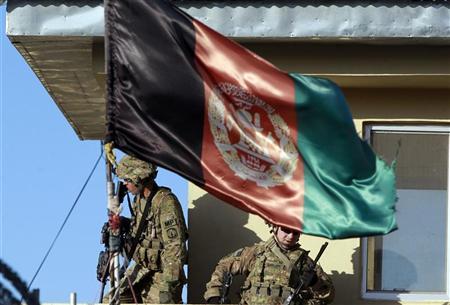The Taliban’s offensive against the capital of Afghanistan’s Helmand Province amidst intra-Afghan talks with their negotiators in Qatar, has shaken the possibility of an immediate withdrawal of US forces that got embroiled in an air attack on the Taliban to support the Afghan forces. Notwithstanding President Donald Trump’s intention to bring all US troops home by Christmas, as an election promise, and having gone through prolonged negotiations to settle the 19-year-old conflict in Afghanistan, the peace process seems to be taking an ugly turn. The military analysis of US generals doesn’t match with President Trump’s election promise.
US DILEMMA ON TROOPS WITHDRAWAL
A US-led invasion ousted the Taliban, post the 11 September 2001 attacks. But after losing 2,400 US soldiers, tens of thousands of Afghan troops, Afghan civilians and spending more than $1 trillion, the whole exercise was appearing to be unsustainable. The Taliban’s assurance of not using the Afghan soil for terrorism seems too good to be true. General Milley, the Chairman of the Joint Chiefs of Staff of US, in an interview has said that the agreement reached with Afghan and Taliban officials to leave Afghanistan was “conditions based,” adding that the US would “responsibly” end the war.
The US will not like to cede crucial strategic space to its competitors, terrorists and their sponsors. It intends to help the Afghan government in combating the Al Qaeda/ISIS/Haqqani Network to ensure that they do not become strong enough to strike its mainland once again. The US is, therefore, looking at leaving some troops in Afghanistan albeit in reduced numbers (2,500 by May 2021) with some air power to support the Afghan forces, in the near term. The US could also be keen to reduce some engagements of troops, as some more flash points are emerging in South China Sea and the Gulf. The delay in withdrawal could also be a necessity, in light of the emerging China-Iran nexus.
DILEMMA FOR AFGHAN GOVERNMENT
The Afghan government has never been comfortable with US talking to the Taliban, but has gone through the motion of the peace deal, perhaps due to the lack of any worthwhile leverages. The UN Security Council backing the US-Taliban peace deal and the promise of US help in facilitating the Afghan-Taliban talks could have comforted them. It is a fact that any foreign prescription for peace will not work in Afghanistan and Afghan National Security Forces need more capacity building to face the Taliban offensive.
The Taliban demands the replacement of the Afghan Constitution of 2004, which promises a presidential system based on elections, by an Islamic Constitution. The strength of the Afghan Constitution is that it guarantees the rights of religious minorities and women, and bestows freedom of expression upon the people and media. Taliban is averse to electoral democracy, freedom of expression and women’s rights; hence the deadlock continues.
TALIBAN IN DRIVER’S SEAT?
Taliban got the better part of the deal by commencing the intra-Afghan dialogue on power sharing with the Afghan government on 12 September, and yet continuing with violence, despite having got most of their prisoners back. Their promise of renouncing support to Al Qaeda and fighting ISIS seems unrealistic, because ISKP, AQIS and Haqqani Network continue with frequent attacks on Afghan security forces, civilians including minorities, with no visible reluctance from Taliban.
The Taliban are reluctant to accept the democratic ideals offered through constitutional amendments because they feel they cannot, through the democratic process, find parliamentary positions. They feel that the electoral process and the Constitution are a western system offering an insufficient role to religious authorities, in disharmony with their version of Islam. Even if their leaders put up a facade of giving reasonable governance, if brought into the power structure, the bulk of their cadres are conservative, hailing from the rural south of Afghanistan, and will pressurise their leaders. Taliban thus claims to construct an inclusive and comprehensive Islamic system of governance that encompasses all spheres of life.
OTHER STAKEHOLDERS
Pakistan, despite hosting the Taliban in crisis, has not forgotten that the latter did not make any concessions to it on the Durand Line, even when they were in power. The Chinese are keen to extend its BRI to Afghanistan to get an alternate axis to the warm waters in the Gulf, should CPEC face problems, besides exploiting Afghanistan’s mineral wealth. The Russians, although interested in International North South Transportation Corridor (INSTC), are not keen to get into Afghanistan again. The reconciliation of all internal factions of Afghanistan amongst each other, looks to be as difficult as the change of behaviour of the Taliban. All the stakeholders affected by Afghanistan’s geo-political dynamics will have to wait and watch the fragile internal situation and shifting strategic re-alignments.
DILEMMA FOR INDIA
India, having made significant investments in Afghanistan, will always hope for an Afghan-elected, Afghan-owned peace and reconciliation process and a popular democratic government in Afghanistan. The growing strength and manoeuvring space of ISKP and AQIS, who have interest in Indian subcontinent is a cause of concern for India, despite Taliban showing willingness to work with India. The other major concern is China-Iran strategic partnership fructifying a $400 billion deal, which may be an impediment for Indian entry routes into Afghanistan through Chahbahar and further connectivity to INSTC, although Iran has not given any signals of disruption of these projects.
India needs to be in touch with all stakeholders, including Taliban. It needs to exercise smart diplomacy to convince that US that Indian engagement with Iran is as much essential to prevent loss of crucial strategic space of Afghanistan to China, as token presence of US troops there. It is certain that some US troops will withdraw, but it remains to be seen whether this Peace Deal will work, or US pull back will leave stronger Taliban, growing IS, emerging AQIS and suffering population of Afghanistan.
The views expressed are personal views of the author, who retains the copyright.

